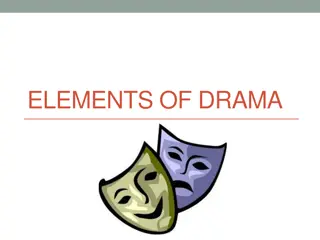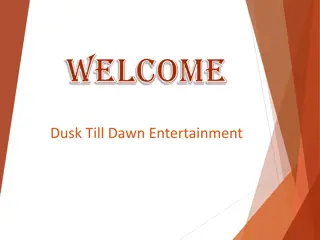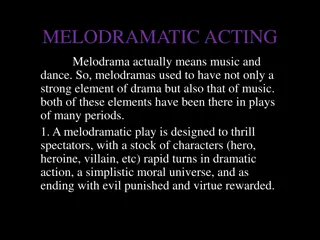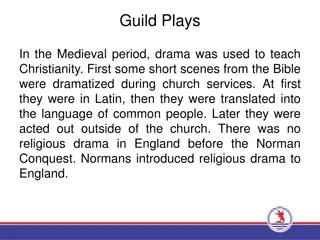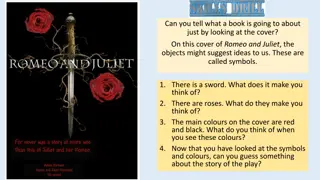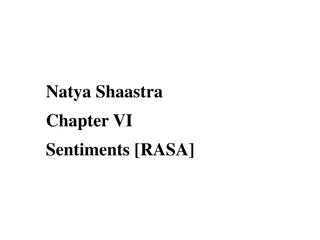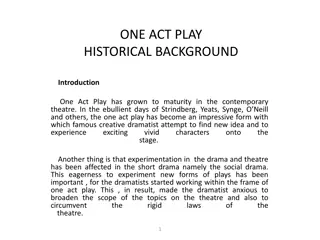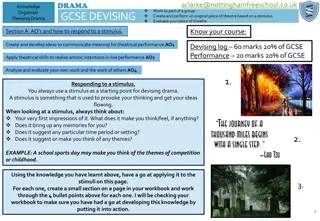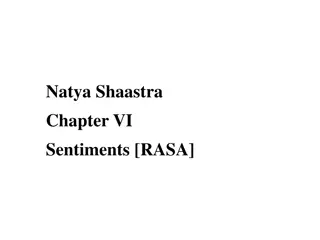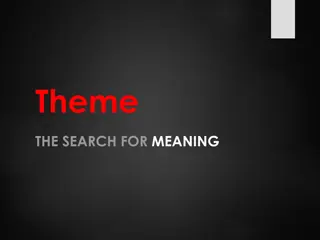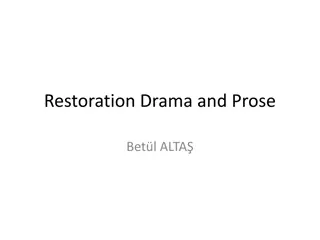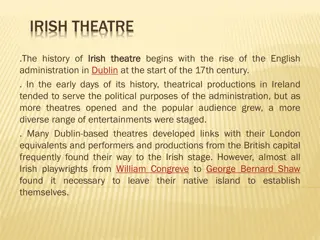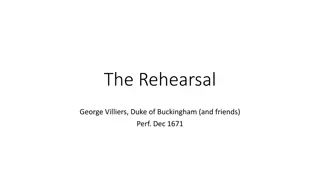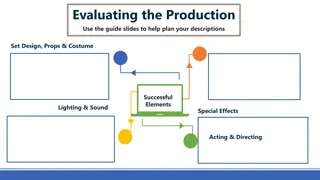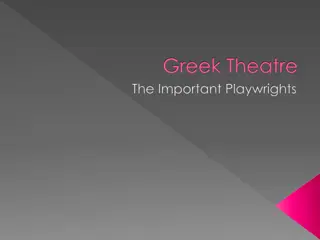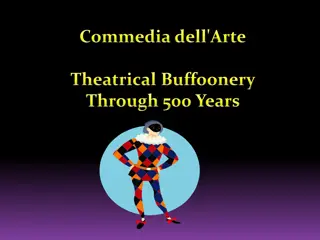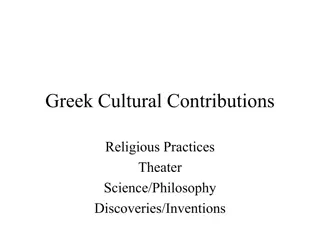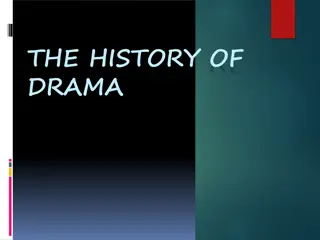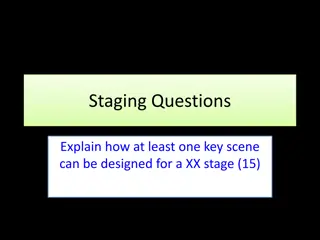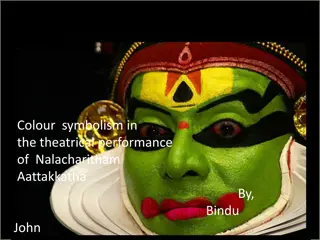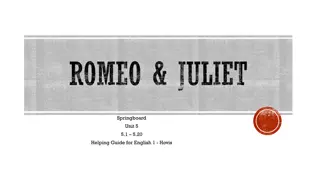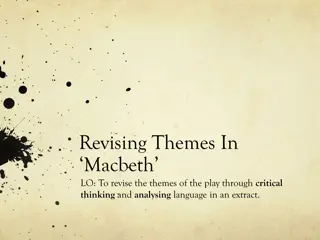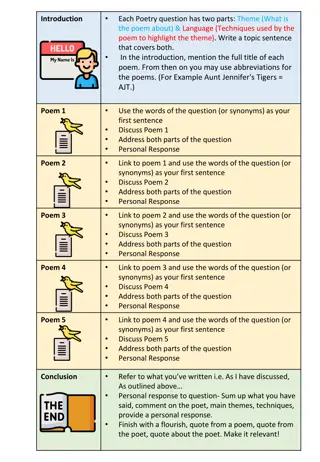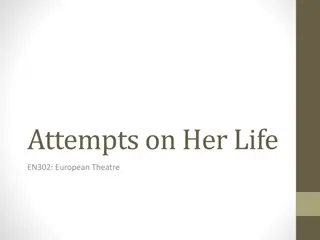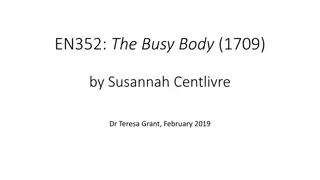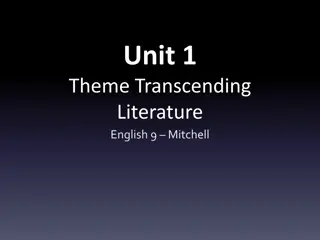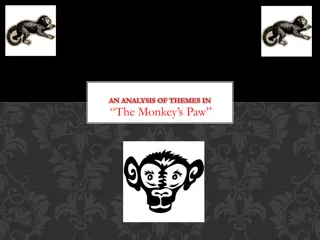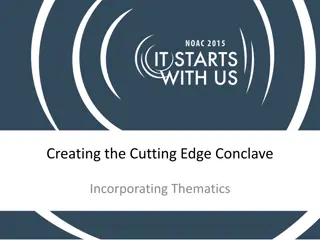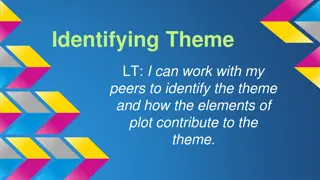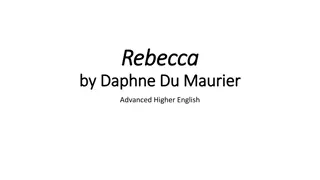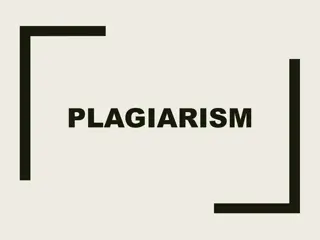Understanding the Elements of Drama and Theater History
Drama, originating from the Greek verb "dran," involves acting and storytelling in front of an audience. Explore the key aspects, from the Globe Theater in London to dramatic structure, actors, and speech forms like dialogue and monologue. Learn about the crucial components such as playwrights, acto
3 views • 22 slides
Exploring Performance and Storytelling in 'Hag-Seed' Prologue
In the prologue of "Hag-Seed" by Margaret Atwood, the performative nature of storytelling is vividly portrayed through the setting of a theatrical performance within the novel. Atwood intertwines themes of reimagining existing stories, life as a performance, and the connection to Shakespeare's works
1 views • 6 slides
If you are looking for Venue Selection in The Lakes
If you are looking for Venue Selection in The Lakes, Dusk Till Dawn Entertainment is leading turnkey event solutions provider in Las Vegas. With almost two decades of experience in the industry, we have taken care of all the groundwork, so you don't have to. From corporate gatherings to private affa
0 views • 6 slides
Understanding Melodramatic Acting in Theatre
Melodramatic acting in theatre combines elements of drama, music, and spectacle to create thrilling performances for audiences. These plays feature stock characters, rapid dramatic action, and a simplistic moral universe where good triumphs over evil. Actors in melodramas must master melodramatic sp
0 views • 7 slides
Medieval Drama: Guild Plays and Moral Lessons
Learn about the evolution of medieval drama in England, from religious guild plays to morality plays and interludes. Guild plays, including mystery and miracle plays, were performed by craft guilds to teach Christianity through biblical stories. Morality plays like "Everyman" aimed to impart moral l
3 views • 9 slides
Symbols and Facts: Uncovering Shakespeare and Elizabethan Theatre
The analysis begins by exploring the symbols present on the cover of "Romeo and Juliet" such as the sword and roses. It then delves into distinguishing facts from opinions regarding Shakespeare's life, touching on key events like his baptism, marriage, and career. Additionally, it provides insights
0 views • 26 slides
Ancient Indian Theatrical Art Forms and the Theory of Rasa in Natya Shastra
The Natya Shastra, attributed to Bharata Muni, is an ancient treatise influencing Indian dance, music, and literary traditions. This comprehensive work covers various aspects of theatre, including acting, dance, music, and more. The concept of Rasa, denoting the aesthetic essence that evokes emotion
0 views • 18 slides
Evolution of One-Act Plays in Contemporary Theatre
One-Act Plays have evolved significantly in contemporary theatre, with famous dramatists like Strindberg, Yeats, and Synge experimenting with this concise form. Initially farcical, one-act plays became more focused, dealing with single dominant situations and themes like human life's complexities. T
0 views • 5 slides
Devising Drama - GCSE Knowledge Organiser
This GCSE Drama Knowledge Organiser provides guidance on devising and performing an original piece of theatre based on a stimulus. It covers how to respond to stimuli, develop ideas for theatrical performances, apply theatrical skills, analyze and evaluate work, and rehearse and refine the devised p
0 views • 10 slides
Exploring the Rasa Theory in Natya Shastra: An Ancient Guide to Indian Theatrical Arts
The Natya Shastra, attributed to Bharata Muni, is a comprehensive treatise on the arts that has shaped Indian dance, music, and literary traditions. This ancient text delves into various aspects of theatre, such as acting, dance, music, and construction, providing a foundation for Indian theatrical
2 views • 18 slides
Unveiling the Power of Themes in Literature
Exploring the fascinating world of themes in literature, this content delves into the essence of themes as life lessons and morals conveyed by stories. Through captivating examples and a thought-provoking narrative about a mean little boy who cried wolf, readers unravel the importance of identifying
0 views • 15 slides
Exploring Restoration Drama and Prose in the Era of Charles II
In 1660, with Charles II's ascent to the throne, Restoration literature saw a revival alongside the political landscape. Playwrights like John Dryden and Thomas Otway contributed significant works, with genres ranging from heroic plays to satirical comedies. The era also witnessed the emergence of t
1 views • 12 slides
History and Evolution of Irish Theatre
Irish theatre has a rich history intertwined with politics and cultural developments. From serving political purposes in the 17th century to nurturing indigenous writers and performers in the 20th century, Irish theatre has seen significant evolution. Dublin has been a key hub for theatrical product
0 views • 24 slides
The Rehearsal and The Antagonists: Satire in Restoration Drama
The Duke of Buckingham's satirical play "The Rehearsal" marked a significant shift in Restoration drama by mocking contemporary heroic plays and literary figures like John Dryden. The play, first performed in 1671, achieved popularity and influenced a tradition of dramatic burlesque on the English s
1 views • 8 slides
Evaluating the Production Elements: Set Design, Props, Costume, Lighting, Sound, Special Effects, Acting & Directing
Use the guide slides to assess various production elements including set design, props, costume, lighting, sound, special effects, acting, and directing. Explore examples from scenes like Peter Pan teaching children to fly, impactful moments, successful elements, and set design descriptions. Gain in
1 views • 7 slides
Understanding Drama Form and Genre
Exploring the nuances of drama, this content delves into the intricate relationship between form and genre. Offering insights into the varied types of forms in drama such as scripted plays, physical theatre, mime, monologues, movement/dance dramas, musicals, and pantomimes, it emphasizes the flexibi
0 views • 17 slides
Insights into Greek Theatre's Renowned Playwrights and Dramatic Elements
Greek theatre history and key figures, including important playwrights like Aeschylus, Sophocles, and Euripides. Aristotle's theories on drama elements, Thespis' innovations, and Aristotle's Unities of Drama are explored. The impact of these elements and playwrights on ancient Greek theatre is highl
7 views • 9 slides
Insights into Italian Commedia dell'arte Traditions
A discussion on the unique characteristics of Italian commedia dell'arte, encompassing the challenges of dialects, minimalist staging with creative prop use, the art of improvisation, stock characters, and the iconic figure of Arlecchino. The performers' ability to improvise, employ comedic elements
4 views • 21 slides
Greek Cultural Contributions: From Olympics to Theater
Ancient Greek civilization made significant cultural contributions in various aspects such as religious practices, theater, and scientific discoveries. The Greeks had a rich tradition of honoring their gods through events like the Olympics and theatrical performances that continue to fascinate audie
4 views • 26 slides
Exploring Plastic Theatre in Tennessee Williams' "A Streetcar Named Desire
Tennessee Williams introduced the concept of plastic theatre in the 1940s to create a new type of theatrical experience that combined non-literary elements with the literary text. This approach aimed to enhance the themes, characters, and language of the play by integrating elements such as setting,
0 views • 9 slides
The Evolution of Drama: A Historical Journey
Drama, originating from ancient Greece, has evolved through the centuries from being a genre of poetry to a distinct theatrical form encompassing tragedy, comedy, and more. The masks of Thalia and Melpomene symbolize the essence of comedy and tragedy, while the Great Dionysia festival in Athens hono
0 views • 41 slides
Designing a Key Scene for Stage Types: In the Round and Proscenium Arch
Exploring the design considerations for key scenes on two different stage types, In the Round and Proscenium Arch. The strengths and weaknesses for performers and audience members are analyzed, offering insights into creating engaging and effective theatrical experiences.
0 views • 27 slides
Exploring Themes in Literature
Explore the concept of theme in literature, understanding that it is not always explicitly stated but revealed through characters' experiences. Themes are subjective opinions that can encompass various life lessons and values. Examples illustrate common themes such as perseverance and self-belief. U
0 views • 7 slides
Exploring Colour Symbolism in the Theatrical Performance of Nalacharitham Aattakkatha John Bindu
Delve into the captivating world of colour symbolism in the theatrical performance of Nalacharitham Aattakkatha John Bindu, where hues convey deeper meanings and emotions. Discover how colours like Pacha, Minukku, Karuthathadi, and more play a vital role in portraying characters and themes, enhancin
0 views • 13 slides
Romeo & Juliet Springboard Unit Study Guide Activities
Explore various activities related to the study of Romeo and Juliet, including analyzing themes, character motivations, and theatrical elements. Engage in discussions, inferencing exercises, and opinion-based responses to deepen understanding of the play.
2 views • 17 slides
Exploration of Faith, Love, and Identity in Chris Goode's Works
Chris Goode's theatrical works delve into themes of spiritual turmoil, crisis of faith, and unconventional relationships. From "God/Head" questioning the existence of God to "Wound Man and Shirley" portraying a unique love story with Wound Man as an unconventional superhero, Goode's performances cap
0 views • 8 slides
Exploring Themes in Shakespeare's Macbeth: Critical Analysis and Reflection
Delve into the themes of blood, night, and sleep in Shakespeare's Macbeth through critical thinking and language analysis. Understand the significance of these recurring words in the play, ponder on the universal themes presented, and consider the contextual relevance of Shakespeare's thematic explo
0 views • 16 slides
Achieving Mission Fulfillment Through Core Themes: An Update
In 2016, our college established four core themes to represent its mission at the core. These themes - Academic Transfer, Career & Technical Education, Essential Skills, and Lifelong Learning - serve as indicators to gauge our progress towards fulfilling our mission. Currently, we are performing abo
0 views • 18 slides
Understanding Rasa Theory in Indian Theatrical Arts
Explore the significance of Rasa theory in Indian theatrical arts as outlined in the Natya Shastra, an ancient treatise on performing arts. Discover how bhavas create rasas, evoking emotions in the audience and transporting them to a parallel world of wonder and reflection. Learn about the historica
0 views • 18 slides
Exploring Common Themes in Poetry Analysis
The task involves analyzing common themes in two poems, identifying how they are depicted in each, and referring to a third poem to demonstrate similar themes. The goal is to quote, analyze, and link these themes across the poems, showcasing a deep understanding of their exploration of bitterness, p
0 views • 11 slides
Crafting Literary Analyses: Study of Poetry Themes and Language Techniques
Explore an insightful approach to analyzing poetry themes and language techniques through a structured paragraph template. Delve into five poems, dissect their themes and techniques, and craft personal responses to each piece. Uncover the beauty of poetry with a systematic examination that includes
0 views • 4 slides
European Theatre: Exploring Dramatic Elements and Themes
European theatre has a rich history and tradition that distinguishes it from other global theatre practices. From Aristotle's dramatic elements to the conflicts faced by characters like Antigone and Creon, this form of theater delves into themes of recognition, imitation, and conflict. Hans-Thies Le
0 views • 35 slides
Comedy Evolution in Restoration Drama
Explore the evolution of comedy in Restoration drama, from the types of comedy to the major playwrights and their contributions. Learn about the dramatic and theatrical themes, conventions, and trends of the period 1660-1709, including the shift towards humane intrigue comedy and the influence of Sp
0 views • 15 slides
Exploring Themes in Short Stories: A Literary Analysis Journey
Delve into the world of short stories as you uncover themes that transcend literature. Understand the components of a short story, analyze conflicts, settings, characters, and points of view. Learn to identify and track themes, both within the stories and in real-world contexts. Enhance your underst
0 views • 35 slides
Exploring Themes in Literature: Insights and Examples
Themes in literature encompass central ideas that provide insight into universal human experiences. Writers convey their perspectives on topics like love, power, survival, good vs. evil, and more, examining how these themes relate to life and human nature. Through close analysis, readers can uncover
0 views • 12 slides
Understanding Major Terms, Cluster Labels, and Themes in IN-SPIRE Training
Major terms in IN-SPIRE are keywords used for clustering documents, while cluster labels in Galaxy view represent the most important terms associated with a point. Themes, calculated by clustering keywords, provide a higher-level description of data. PNNL techniques like RAKE and CAST help extract a
0 views • 4 slides
Understanding the Impact of Themes in Conclave and NOAC Events
Exploring the significance of themes in Conclaves and NOAC events, this content delves into the definition of themes, past themes such as "The Power of One," and how to develop and incorporate themes effectively. Discover the essence of themes in creating memorable and impactful events.
0 views • 25 slides
Exploring Themes in Literature: Group Activity for Analyzing Plot Elements and Identifying Themes
Engage in a collaborative group activity to delve into the themes of literary works by analyzing plot elements and identifying underlying messages. Understand the characteristics of themes, learn how to find themes in texts, and assign roles to group members for a comprehensive exploration of theme
0 views • 10 slides
Analysis of "Rebecca" by Daphne Du Maurier: Themes, Characters, and Setting
Delve into the intricate narrative of "Rebecca" by Daphne Du Maurier through an analysis of key chapters, characters, themes, and the impactful setting. Explore the evolving relationship between the narrator and Maxim, the complexities of Mrs. Danvers, and themes like jealousy, transition, and power
0 views • 18 slides
Uncovering Theatrical Depths in Hamlet's Characterization
Unveiling the theatrical intricacies within Hamlet's character, this piece delves into the subtext of his actions and the underlying motives behind his feigned madness and calculated interactions, as depicted in A. Kernan's work "The Playwright as Magician". Through a close analysis of pivotal scene
0 views • 31 slides
